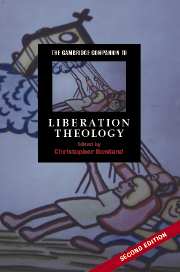Book contents
- Frontmatter
- Introduction: the theology of liberation
- Part I Contemporary Liberation Theology
- 1 The task and content of liberation theology
- 2 ‘Action is the life of all’: the praxis-based epistemology of liberation theology
- 3 Liberation theology in Asia
- 4 Black theology
- 5 Feminist theology: a critical theology of liberation
- 6 Demythologising liberation theology: reflections on power, poverty and sexuality
- Part II Aspects of Liberation Theology
- Part III Analysis and Criticism
- Epilogue: the future of liberation theology
- Select bibliography
- Index
- Series list
5 - Feministtheology: a critical theology of liberation
from Part I - Contemporary Liberation Theology
Published online by Cambridge University Press: 28 January 2008
- Frontmatter
- Introduction: the theology of liberation
- Part I Contemporary Liberation Theology
- 1 The task and content of liberation theology
- 2 ‘Action is the life of all’: the praxis-based epistemology of liberation theology
- 3 Liberation theology in Asia
- 4 Black theology
- 5 Feminist theology: a critical theology of liberation
- 6 Demythologising liberation theology: reflections on power, poverty and sexuality
- Part II Aspects of Liberation Theology
- Part III Analysis and Criticism
- Epilogue: the future of liberation theology
- Select bibliography
- Index
- Series list
Summary
Feminist theology is a global theology, or rather, a family of contextualtheologies committed to the struggle for justice for women and the transformationof society. It is therefore a critical theology of liberation engaged in thereconstruction of theology and religion in the service of this transformationprocess, in the specificity of the many contexts in which women live. Whereas inEuropean and North American contexts the term 'feminist theology' is mostfrequently accepted, in other parts of the globe, in order to heighten visibility,recognise identity and respect the diversity of experiences and goals, thedifferent theologies of Asian, African and Latin American women have acquiredtheir own distinctiveness, together with Womanist theology (the theology of theUnited States black American women and women of colour), and Mujerista theology(the liberation theology of Hispanic women). Increasingly emergent is thespirituality of, for example, indigenous American Indian women and indigenousIndian women in Latin America, as well as of aboriginal women in Australia, NewZealand and the Pacific.
If there is a commonality of purpose in all this diversity, it is the liberationof humankind together with all sentient life. The words of the American poetAdrienne Rich are widely inspirational:
My heart is touched by all I cannot save;
So much has been destroyed
I have to cast my lot in with those who
with no extraordinary power
re-constitute the world.
- Type
- Chapter
- Information
- The Cambridge Companion to Liberation Theology , pp. 105 - 122Publisher: Cambridge University PressPrint publication year: 2007
- 4
- Cited by

